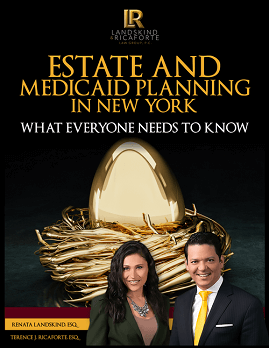Families with young children have very different estate planning needs from wealthy retired couples. Couples in a second marriage must consider important factors that couples in a first marriage don’t. Single people may only need a simple plan for now. Wherever you are in life, you need to think about what will happen to the people you love, your property, and your assets if something unexpected happens to you. At Landskind & Ricaforte Law Group, P.C., we pride ourselves on meeting you where you are in life as we help you create an estate plan that addresses your unique needs and desires.
What Is an Estate Plan?

Legal documents that address what will happen to your property, assets, children—and even to you—if you become incapacitated or die make up an estate plan. While there are some documents every adult should file, others are dependent on your life stage, income level, and wishes for the future. Some basic documents that we will discuss with you in our initial consultation include the following:
- Last Will & Testament. The cornerstone of any estate plan, a will can ensure that your property is distributed according to your wishes after your death. You may name family members, friends, or charities as your beneficiaries in a will. Your will can also name guardians for minor children and express your wishes for your own funeral and burial. Without a will, your property will be distributed according to New York State law and will incur high estate taxes.
- Trusts. There are several kinds of trusts that can be utilized to meet your estate planning goals and to avoid probate. Which trusts make sense to you will depend on your specific needs and desires, but trusts can be used to control the distribution of your assets according to your wishes, provide for children with special needs, provide tax savings, assist in Medicaid eligibility, contribute to a charity, and much more.
- Durable power of attorney. This important document names a trusted friend or family member to make legal decisions for you if you suffer a debilitating illness or become incapacitated. Your appointed agent will have the authority to do anything with your property and assets that you could do. It will remain in place until you recover or until your death.
- Health care proxy. This document allows you to appoint someone as your health care agent, authorizing them to make medical decisions on your behalf if you become unable to make those decisions yourself.
- Living will. Also known as an advance directive, this document expresses your wishes regarding end-of-life care. Do you want to receive life-sustaining treatments such as artificial nutrition and hydration, pain management, or CPR? Under what circumstances? A living will can specify your wishes.
Depending on your property and assets and the dynamics of your family, there may be more pieces to your estate plan. Our experienced team will help you determine what you need.



